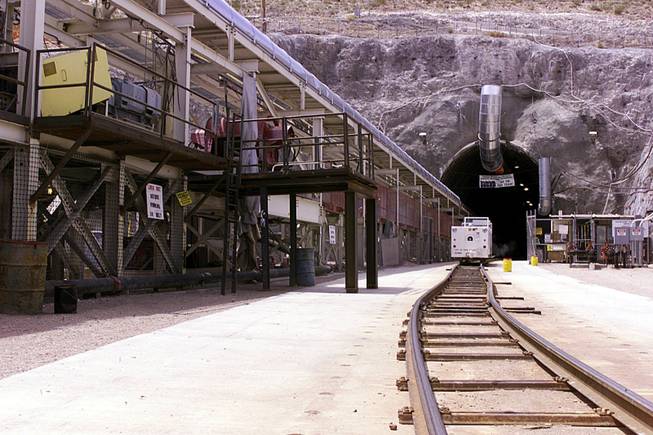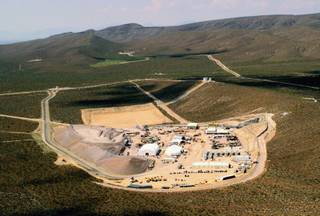
File photo
Yucca Mountain is located about 90 miles northwest of Las Vegas.
Thursday, June 2, 2011 | 4:44 a.m.
Sun coverage
The Energy and Commerce Committee has turned into a veritable cockfighting ring over Yucca mountain in the last few weeks, as lawmakers pit Energy Department official against Energy Department official, nuclear commissioner against nuclear commissioner, and Nevadan against Nevadan to publicly duke it out and, in the process, discredit the movement to shut down the nuclear waste disposal site.
Yucca mountain has seen a burst of boosterism since Republicans took over the House five months ago. Since then, House leaders have tried to force-fund the project’s extension for fiscal 2011, and when that failed, came back with even stronger language for fiscal 2012.
On Wednesday, House Appropriations leaders released an Energy and Water spending package that includes “$35 million to support Yucca Mountain activities, including $10 million for the Nuclear Regulatory Commission to continue their review of the license application” and “provisions to forbid the use of funds to close down the program.”
But that’s just backdrop to the political face-offs being played out before the committee.
The Nuclear Regulatory Commission was the first to be brought into the committee’s ring for a reckoning, when chairman Fred Upton and Rep. John Shimkus, the chairman of the House Energy Subcommittee on Environment and the Economy, launched a formal investigation into the NRC’s delay of a vote on whether the Obama administration has the authority to dismantle the Yucca project, which it began doing in 2010.
The specter of that ongoing investigation — which leading Democrats on the committee, who are not being included in Republicans’ interviews of witnesses, have charged is partisan and unfair — was hanging over the committee’s meeting Wednesday, as lawmakers accused Energy Department officials of making the decision to shutter Yucca purely for political popularity points.
It’s now up to the NRC, and a series of courts, to decide whether that decision was legal under the Nuclear Waste Policy Act.
But even if it’s the Republicans driving the issue, on Wednesday it was very clear that recriminations of the Yucca takedown are very bipartisan.
Nevada lawmakers, almost all of whom vehemently oppose the development of Yucca to house nuclear waste, have painted the project as a $100 million boondoggle, $10 million of which has already been thrown down a vast hole in the ground in Nye County.
But lawmakers from nuclear-producing states who want to see it going are seeing much bigger wasted-dollar signs: the federal government has already paid out about $1 billion in lawsuits for reneging on promises made under the Nuclear Waste Policy Act to cart off nuclear waste.
According to the Department of Energy’s Inspector General, the government will have to spend about $15.4 billion more in the next few years to pay off the rest, if no alternative to Yucca is developed before 2020.
Armed with alarming numbers, a series of lawmakers pressed Assistant Energy Secretary Pete Lyons — a Nevada native, and former nuclear regulatory commissioner — to say in plain speech Wednesday whether the decision to dismantle the Yucca project was made because of scientific concerns, which would seem to obviate the legal obligations of the NWPA, or other concerns, which would put the administration’s decision on shakier legal footing.
After several minutes of staving off questions with a carefully worded response about technical considerations, Lyons broke, telling the panel that “it was a question of social, public acceptance.”
Lawmakers leapt on that.
“There is no statutory authority for social acceptance,” Republican Rep. Cory Gardner of Colorado said flatly to Lyons in his questioning.
Lyons agreed there was not.
“This flagrant statement that social acceptance is now a legal criteria I don’t understand,” echoed Washington Democrat Jay Inslee, who called the rationale Lyons presented “unacceptable.”
“Is there something unique about Nevadans that make them unique, and this would be welcomed as rosewater in the rest of the United States?” Inslee asked. “What evidence do you have that there’s any more socially acceptable place?”
Administration officials suggested the Waste Isolation Pilot Plant repository, located in the Carlsbad area of New Mexico, where public enthusiasm for the project is measurably more present than it is in Nevada.
But the more direct answer to Inslee’s question may have been “ask a Nevadan” — and they did.
“There are many of us who live next to Yucca mountain who support the completion of the licensing process,” said Gary Hollis, chairman of the five-member Nye County Board of County Commissioners, all of whom, he pointed out, had expressed their support for continuing the Yucca project and been reelected by their constituents.
“It is my community, my family. My friends live and work here. I would never accept a federal facility be located in my county if I thought it was unsafe,” he said.
There has been support for the project from the six Nevada counties most geographically close to the site, a consideration that is doubtless tied to the federal investments that came into the area on the back of the decision to focus waste facility development efforts exclusively on Yucca starting in 1987, but also lends some credibility to the notion that the scientific concerns aren’t that bad.
But even if Energy officials steered clear of citing any concerns with the science behind the site, Nevada Rep. Shelley Berkley — who has for years been almost rabid in her opposition to Yucca and was invited to testify before the committee along with two of her congressional compatriots who support the project — had them in spades and threw them out on the table in an avalanche of testimony.
“Originally, they were going to store nuclear waste in Yucca Mountain,” Berkley explained with more than a hint of incredulity in her voice. “Then they realized there were ground water problems. So we were going to store it in containers with a titanium shield to protect it from the dripping water. Then they realized that wasn’t enough because the titanium shields were going to erode. So then they were going to build concrete bunkers to contain the titanium shields to contain that contained the canisters. And then the last secretary of energy in the Bush administration actually said he was going to create an army of robots to go down to Yucca Mountain, because man can’t go down there to protect us from the nuclear waste leakage.”
“Make no mistake, the Yucca mountain project was born of politics, starting with the infamous 1987 ‘screw Nevada’ bill...which did away with any pretense of science,” said Berkley, who in the wake of the Fukushima disaster in Japan has encouraged a dismantling of the U.S. nuclear industry if the country can’t come up with a better storage option, as Germany just announced it would do, by 2022.
That position goes further than her delegation colleagues in the Senate, Harry Reid and Dean Heller, who both oppose Yucca Mountain but have encouraged continued investment in nuclear.
“If anyone watching what’s happening in Japan still has the audacity to suggest that for our country, shame on us all...I will lay my body down on those railroad tracks to prevent any train that has nuclear waste in it from going to Yucca Mountain,” Berkley finished dramatically.



Join the Discussion:
Check this out for a full explanation of our conversion to the LiveFyre commenting system and instructions on how to sign up for an account.
Full comments policy